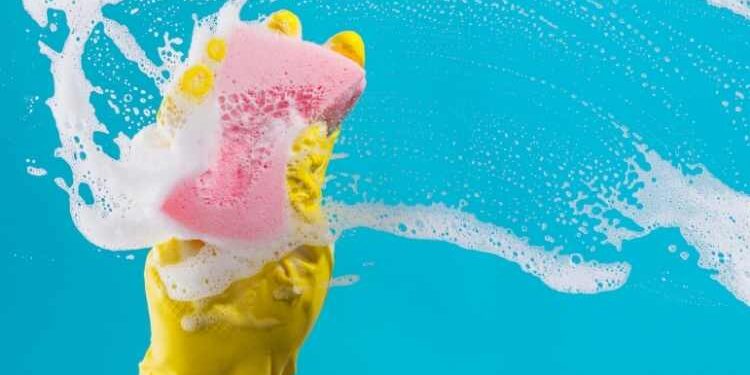Laundry detergents have only been available since the first half of the twentieth century. The typical American household is estimated to wash 8 to 10 loads of laundry each week. While most traditional detergents are phosphate-free, there are additional issues about their chemical usage.
How laundry detergent works
Non-bio detergents use chemicals like surfactants to clean clothing, while biological ones use enzymes to break down fat, grease, and proteins. Bio detergent enzymes may harm silk and wool, as well as exacerbate eczema and cause skin irritations. A non-biodegradable surfactant or other compounds that are not environmentally friendly.
The difference between plant-based and regular detergent
Because they utilise natural ingredients produced from plants, plant based laundry detergents are green or eco detergents. On the other hand, conventional detergents are non-plant-based detergents made from synthetic surfactants and are mainly petroleum-based.
Conventional detergents include chemicals that may contaminate water supplies and damage aquatic life, mainly if they contain phosphates.
What is the most effective laundry detergent?
Your lifestyle determines the efficacy of washing detergent.
Bio laundry detergents perform better at low temperatures, while non-bio laundry detergents are better for sensitive skin. Bio detergent may help you save money by washing at a reduced temperature. Non-bio detergent is preferable if you have sensitive skin, eczema, or small children.
But what about washing detergent made from plants?
Although more costly, eco-friendly non-bio detergents are the most excellent choice for your health and the environment. They’re also more concentrated, which means you’ll need less detergent for each load. Eco-detergents may also be used at low temperatures.
Green detergents that are not tested on animals, biodegradable, phosphate-free, and packaged in recyclable containers are the best!
Lumehra:
Lumehra claims that you can do 50 loads of laundry with just one pack of Lumehra’s laundry detergent. Not only that, but it also includes an ultra-concentrated cleaning formula with active ingredients that ensures that your clothes are thoroughly cleaned after each wash. This means that you can clean more with less detergent, and a little goes a long way.
With every box of Lumehra’s laundry detergent, you receive a complimentary teaspoon for simple measuring. So all you have to do is take one full teaspoon of our detergent, which will help you clean a whole laundry load. In addition, your clothes will have a light lavender scent after they’ve been washed.
Essential oils in our laundry detergent help remove tough stains like grass, grease, coffee, and tea. So even the most stubborn stains are no longer an issue!
Which laundry detergent is better for the environment?
Chemicals in traditional detergents and stain removers are not only damaging to our skin, but also to the environment. Phosphates are the worst for this, as previously stated, although they may still be present in certain goods.
Phosphate is a kind of salt that is often used in fertiliser and produces excessive algae development when it pollutes water. The algae produces eutrophication, which depletes the oxygen in the water and disrupts the ecosystem’s natural equilibrium. Some businesses even utilise alternatives that are possibly hazardous to people to get past the phosphate prohibition. Some dishwashing detergents still include phosphorus.
Non-bio laundry detergent contains synthetic surfactants, which are acute poisons to fish. These surfactants may harm fish gills and cause asphyxiation, as well as being poisonous inside. Surfactants may damage aquatic life, particularly invertebrates, by interfering with their growth and development at low levels.
Surfactants “have no detrimental effect on the aquatic or sediment ecosystems at present levels of usage,” according to a 2014 study on their use. It’s essential to remember, however, that any greater use of surfactants may alter this.
Green detergents don’t include any of these main pollutants and are totally safe to flush down the toilet. These eco-friendly detergents biodegrade spontaneously and have no known disadvantages apart from price.
Conventional detergents, unlike green detergents, may include chemicals that are known or suspected to be carcinogenic. The FDA and the Environmental Protection Agency have classified 1,4dioxane, which is mostly found in cosmetics, as “likely to be carcinogenic to humans” based on adequate evidence of its carcinogenicity in animals.
Why you should prefer to use a plant-based laundry detergent?
Plant-based laundry detergents are unquestionably healthier for our health and the environment.
Other compelling reasons to switch to green detergents include:
- In addition, using concentrated detergents saves you money over time.
- Many eco-detergents may be used at low temperatures, thus conserving energy.
- Reduce dependence on petroleum – mining for oil pollutes water and the air.
- Better for your health and the environment.
- Can access water sources without contaminating or safely hurting aquatic life.
How to make your laundry more eco-friendly
You may go above and above to make your laundry even more ecologically friendly. Many choices are available, but only you can choose what is best for your lifestyle and budget.
Washing detergent may be replaced with reusable laundry gadgets like EcoEgg Laundry Egg.
If you want to utilise natural stain removers, look for something like Ecozone’s stain remover tablets that doesn’t include chlorine. Because bleach production releases harmful pollutants into the air, avoiding bleach or chlorine products is recommended.
Energy-efficient washing machines utilise less water and energy to get the same or better results than traditional washers. To cut down on the number of washes you do each week, make sure you only wash complete loads and question yourself whether anything truly needs to be cleaned. Everything’s just been a day, and it looks and smells great? Even if you wear it for a few hours longer, you can cut down on the amount of laundry you have to do overtime.
Clotheslines and dryer balls may also help decrease your carbon footprint since clothes dryers are a huge energy drain.
When shopping for clothing, keep in mind what you’re getting: synthetic fabrics may release microplastics with each wash. Natural materials, such as wool, bamboo, and organic cotton, are more environmentally friendly and help decrease microplastic contamination.
